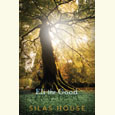Sloughing Off the Nay-Sayers
How J.T. Ellison learned to ignore the damning voices and get on with writing thrillers
I was twenty years old when I presented my senior thesis to a room full of English majors and professors. It was the culmination of three years of creative writing: a group of twenty poems, the best I could glean from those years of work, and my first attempt at a short story. I was in a Hemingway phase, and the protagonist was a male. The story, “The Lighthouse,” was a murder mystery set in England, overlaid with a gothic, penetrating fog which whisked away souls. Hands shaking, gorge rising, I stood in front of the room and tried to read. Moments after I began, panic overwhelmed me, and I had to stop, step outside, and gather myself — the beginnings of a fear of public speaking so severe it took years to overcome.
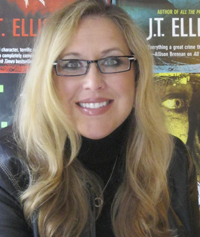 When it was over, my peers clapped, but their applause was outstripped by the dour expressions of the faculty. They’d already read my thesis, already formed their opinions. The chair of the department pronounced the short story “too informed by B-grade detective fiction,” a statement I found outrageous. Yes, the voice was dark; yes, it was a clumsy first attempt at fiction. But rereading the story these twenty-odd years later, I can clearly see the seeds of my career as a thriller-writer being sown.
When it was over, my peers clapped, but their applause was outstripped by the dour expressions of the faculty. They’d already read my thesis, already formed their opinions. The chair of the department pronounced the short story “too informed by B-grade detective fiction,” a statement I found outrageous. Yes, the voice was dark; yes, it was a clumsy first attempt at fiction. But rereading the story these twenty-odd years later, I can clearly see the seeds of my career as a thriller-writer being sown.
The second blow, by far the worse of the two, came from my thesis advisor herself, a professor with long black hair, studious glasses, and a penchant for flowing skirts and bohemian sandals. When I asked her for a recommendation to an M.F.A. program, she shook her head sadly and sighed, “This isn’t the path for you. Your work isn’t good enough to be published.”
Stupidly, I listened. Instead of spending the next several years writing fresh material, honing my craft, finding my voice, I believed her. And I quit writing.
I was a dual major in college, Politics and English, and I had spent my college years interning in Washington, D.C., in a variety of roles, from the White House to the Hill. I loved the intensity and intellectual challenge of the political world as much as I loved the English poets. So I dusted myself off, marched to my thesis advisor on the political side, and asked for a recommendation to graduate school in political science. To my shock and dismay, she too shook her head. “I’m sorry, dear, but you simply don’t have the temperament for graduate work.”
Furious, hurt, feeling betrayed by the institution I’d spent the past three years of my life swanning to, I set out to prove her wrong. (The politics professor, that is, not the writing professor. The words not good enough had killed my creative spirit so thoroughly that I planned never to write again.) And so I graduated, sans recommendations, and went directly to the White House for my first full-time position, in the Office of Science and Technology Policy, under a brilliant but quirky nuclear physicist who had no time to waste on a twenty-one-year-old glorified secretary.
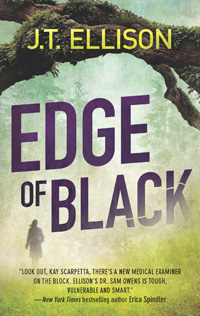 I also applied to graduate schools. The Kennedy School of Government at Harvard and George Washington University’s new Graduate School of Political Management. On my writing samples, the admission director at GW wrote a personal note: “You write beautifully. We would be honored to have you in our program.”
I also applied to graduate schools. The Kennedy School of Government at Harvard and George Washington University’s new Graduate School of Political Management. On my writing samples, the admission director at GW wrote a personal note: “You write beautifully. We would be honored to have you in our program.”
So there, mesdames.
The first night of class, I met a handsome young man who, after we graduated, became my husband. During that time, I moved from the White House to the Department of Commerce as the Confidential Assistant to the Secretary of Commerce; then to a brief, disastrous stint as a political pollster; and then on to Lockheed Martin and two more defense contractors.
There was a common theme to each position. I struggled. I chafed. I was good at what I did, but I despised doing it. Time and again I found myself in meetings with superiors who asked what the problem was. I had no answers. The problem was not them, not the job, nor the temperature in my office, nor the near-daily sexual harassment. (Defense work was a bastion of maleness, on every level.) The problem was the voice in the back of my head that screamed at me all day and all night, This isn’t you. This isn’t right. This isn’t who you want to be.
You notice I say nothing about my creative work during this time. Because there was none. Oh, I wrote the odd poem, but my enthusiasm was gone. I’d lost my love for creative writing. No, worse: I’d given it up without a whimper. Sometimes it takes only one person, and one sentence, to crush that flame entirely. If my professor had just said, “You need more time to find your voice; keep writing, and try again in a few years,” I would have done so. If she’d given even the tiniest bit of encouragement, perhaps I would have written a drawer full of manuscripts.
Fast forward eight years. Handsome boy from graduate school wanted to move back to his hometown of Nashville. He’d brought me to visit once before and started my tour at Davis-Kidd Booksellers. (The man knows his business.) Though I wasn’t writing, I was reading still, voraciously. I figured so long as we were near Davis-Kidd, we’d be all right. So off to Nashville we went and settled into the west side of town.
The farcical means by which I returned to a life as a writer—adopting a stray cat, going to work for the vet who saved her life, mopping up dog urine and watching the castration of a Siamese cat, and then, on day three of this unique torture, herniating a disc and needing back surgery—is fit for fiction itself. During the recovery, I discovered a writer named John Sandford, and something clicked. My magnetic poles shifted, and I had one, simple, arrogant thought.
If he can do it, so can I.
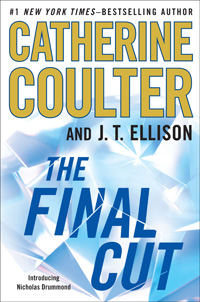 Ah, hubris. My professor was right, of course. I wasn’t good enough to be published. Not then, and not when I started writing again. I dabbled for a couple of years, but in 2003 I began in earnest, deconstructing crime novels to see how the structure worked, laying down words, joining a critique group. My handsome boy, God bless him, let me stay home and do this whilst he toiled away at The Tennessean.
Ah, hubris. My professor was right, of course. I wasn’t good enough to be published. Not then, and not when I started writing again. I dabbled for a couple of years, but in 2003 I began in earnest, deconstructing crime novels to see how the structure worked, laying down words, joining a critique group. My handsome boy, God bless him, let me stay home and do this whilst he toiled away at The Tennessean.
And I wrote a book.
Or what I thought was a book.
I made every rookie mistake in the industry: submitting what was basically an overwrought, gratuitously violent novella directly to New York editors (who rejected me), calling up local writers at home (so sorry, Steve Womack), and being an all-around idiot. I didn’t know about writers’ organizations, or awards, or—let’s be honest here—anything.
But I learned. I joined Sisters in Crime, began to write for a group blog, tossed the gratuitously violent novella in the trash, and wrote a proper book. An agent saw my work online and, as fate would have it, asked to read my book just as I was crafting a query letter to him. Serendipity.
He couldn’t sell my first book, and I was immediately plunged back into the abyss I’d spent eight years trying to crawl out of. You aren’t good enough. You simply are not good enough. That negativity lurks every minute of every day for a creative person. We allow others to make judgments for us. We allow reviews and acceptances and complete strangers who hate our work to define us.
To be a writer, to come daily to the page, to slough off the voices of the naysayers, takes more than just a talent for stringing words together and machinating stories. It takes a determination to ignore the critics, the pettiness of your own muse, the collective voice of the imaginary literary chorus singing your daily demise. It is a process of natural selection, and only the strong survive. It takes courage, and a wee bit of denial, and a roaring ego. (We have to believe the story we’re telling is interesting enough to capture the attention of the reader. With any luck, hundreds of thousands of readers.) So I got back to it. I wrote my agent a new book, and he sold it. I was thirty-eight when All the Pretty Girls was released. It has been published in twenty-four countries and twelve languages so far.
The past six years have been a ride, with ups and downs like every writing career. But a career it is. Right now, I’m working on my thirteenth (lucky number thirteen!) novel. Nine are out in the world, with the tenth, The Final Cut, co-written with Catherine Coulter, coming out September 17.
I come to the page daily with hope, but also with a whopping dose of humility, because I recognize how very lucky I am. I’m doing what I love. That haunting voice, the one who screamed at me for eight years, who knew I shouldn’t have given up, is gone, replaced by the purring of my muse. I wake each day with gratitude and excitement, knowing I am, at last, doing what I was put on this earth to do. I don’t have eight years of work in a drawer, and that is a shame. But I have the future, and I refuse to let someone else decide my life for me again.
[This essay appeared originally on May 24, 2013.]
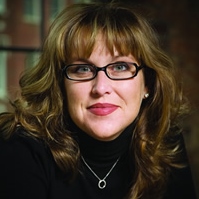
J.T. Ellison is the New York Times-bestselling author of eleven critically acclaimed novels, including The Final Cut with Catherine Coulter, When Shadows Fall, Edge of Black and A Deeper Darkness. Her work has been published in over twenty countries.
